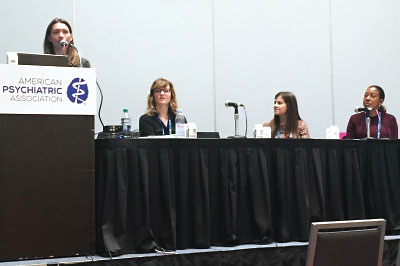When a 35-year-old patient comes to your office with reports of experiencing new panic attacks, difficulty getting out of bed, and sleeping just four to five hours a night, the decision to treat with medication would be considered. Now, what if this same patient—who has a decades-long history of depression, anxiety, and chronic insomnia—is also 24 weeks pregnant with twins?
This case was among several presented to attendees in an Annual Meeting session last month in San Francisco about the evaluation and treatment of pregnant women with mood disorders. It was chaired by Kara Driscoll, M.D., owner of the Allegro Center LLC, a reproductive psychiatry practice, and a health system clinician in the Department of Psychiatry and Behavioral Neurosciences at Northwestern University.
With few exceptions, most psychiatric medications can be safely continued in pregnancy, when the risk of withholding treatment is deemed greater than the risk to the developing fetus, speaker Jennifer Sprague, M.D., an instructor and women’s mental health fellow in the Department of Psychiatry and Behavioral Sciences at Northwestern University, told attendees.
While depression is common during pregnancy (affecting more than 1 in 5), women who experience it are at higher risk for postpartum depression, Sprague said. Left untreated, anxiety and depression during pregnancy may result in poor outcomes for the infant, including small size for gestational age, preterm birth, low birth weight, and poor attachment, Sprague said.
Untreated mood disorders may increase the risk of pregnant women engaging in high-risk behaviors, such as substance use, and pregnancy complications, such as preeclampsia. Suicide risk is also increased, which is the second-leading cause of death for women in the postpartum period.
A study of pregnant women with bipolar disorder found that on average those who stopped taking psychiatric medications experienced a recurrence of symptoms after about nine weeks, explained Hannah Betcher, M.D., an instructor and women’s mental health fellow in the Department of Psychiatry and Behavioral Sciences at Northwestern University. This was more than seven months earlier than those who continued taking medications.
Unfortunately, some physicians have not gotten the message, and manywomen abruptly stop their psychiatric medications when they find out they’re pregnant, Sprague said. “One of the missions of our fellowship involves going out into the community to meet with providers to explain why they shouldn’t be recommending that women stop their antidepressant or antianxiety medications during pregnancy.”
Psychiatrists may need to see patients more frequently during pregnancy to watch for changes in symptoms because physiological changes that occur during pregnancy affect absorption, distribution, and metabolism of many psychiatric medications, explained Crystal Clark, M.D., M.Sc., an assistant professor of psychiatry and behavioral sciences, obstetrics, and gynecology at Northwestern University. As the pregnancy progresses, higher doses of medication may be needed due to changes in the mother’s metabolism.
However, with regard to treating patients with lithium, Clark recommends discontinuing the medication to avoid toxicity concerns about 48 hours prior to their delivery. She restarts the medications at the patient’s lower pre-pregnancy dose two days after delivery.
The speakers also reviewed the evidence surrounding some common psychiatric treatments for mood disorders during pregnancy:
•
Selective serotonin reuptake inhibitors (SSRIs): Evidence does not suggest that use of SSRIs during pregnancy increases the risk of miscarriage or birth defects. However, some of these medications may raise the risk of neonatal adaptation syndrome, which can cause neuromuscular, central nervous system, and/or respiratory difficulties. This risk is more common with fluoxetine, paroxetine, and venlafaxine, Sprague said. Another concern is a marginal increase in risk of persistent pulmonary hypertension in the infant. As for the impact on child development, SSRI exposure was associated with slower motor development initially, but these differences resolved within 18 months or so.
•
Benzodiazepines: Exposure to these medications was previously thought to increase the risk of birth defects, specifically cleft lip and/or palate, but more recent reviews have not found an increased risk in birth defects, Sprague explained. However, studies show that exposure to benzodiazepines poses higher and more long-term risk of neonatal adaptation syndrome than does SSRI exposure. Other risks include infant withdrawal, preterm birth, and slower development (any developmental delays typically resolve by 18 months to 2 years of age).
•
Antipsychotics: In general, most antipsychotics do not increase the risk of birth defects, with the exception of risperidone. One study found a higher rate of neonatal adaptation syndrome with typical antipsychotics than with newer atypical antipsychotics. However, exposure to quetiapine—the most commonly used antipsychotic during pregnancy—and olanzapine is known to increase the risk of gestational diabetes and neonatal adaptation syndrome.
As for the treatment of psychiatric symptoms in the case of the woman who was pregnant with twins, she was started on clonazepam 0.5 mg twice a day for about six weeks while she was simultaneously worked up to a dose of 150 mg of sertraline. She also took part in cognitive-behavioral therapy, which she found very helpful for managing her anxiety. She delivered healthy twins and breastfed them, supplementing with formula as needed. ■
An article by Clark, “Treatment of Peripartum Bipolar Disorder,” can be accessed
here.

